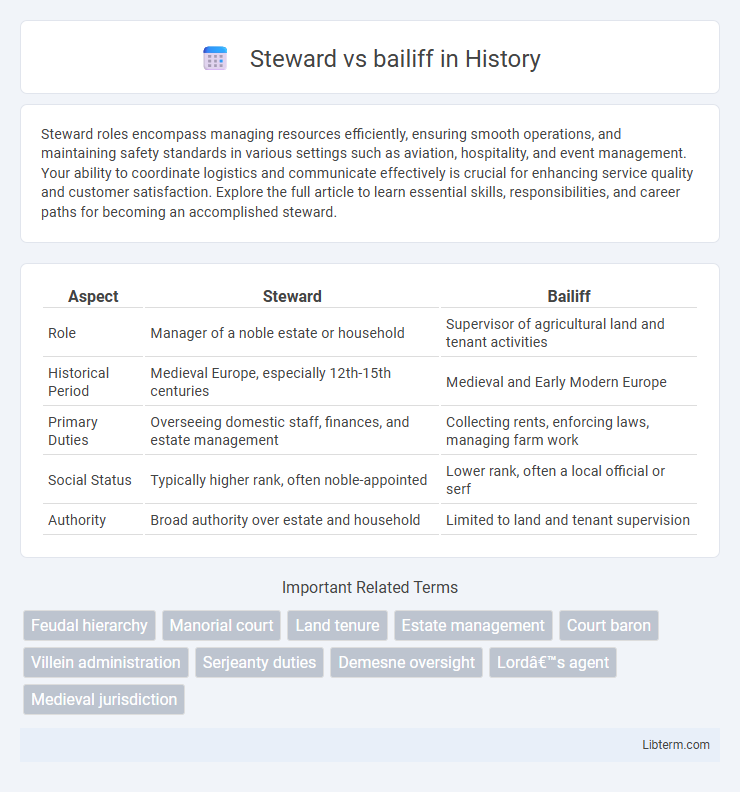Steward roles encompass managing resources efficiently, ensuring smooth operations, and maintaining safety standards in various settings such as aviation, hospitality, and event management. Your ability to coordinate logistics and communicate effectively is crucial for enhancing service quality and customer satisfaction. Explore the full article to learn essential skills, responsibilities, and career paths for becoming an accomplished steward.
Table of Comparison
| Aspect | Steward | Bailiff |
|---|---|---|
| Role | Manager of a noble estate or household | Supervisor of agricultural land and tenant activities |
| Historical Period | Medieval Europe, especially 12th-15th centuries | Medieval and Early Modern Europe |
| Primary Duties | Overseeing domestic staff, finances, and estate management | Collecting rents, enforcing laws, managing farm work |
| Social Status | Typically higher rank, often noble-appointed | Lower rank, often a local official or serf |
| Authority | Broad authority over estate and household | Limited to land and tenant supervision |
Introduction to Stewards and Bailiffs
Stewards and bailiffs are distinct roles with specific functions in legal and event management contexts. A steward typically manages event safety, ensuring order and assisting attendees, while a bailiff is an officer of the court responsible for maintaining courtroom security and enforcing court orders. Understanding the responsibilities of stewards and bailiffs clarifies their crucial roles in maintaining safety and legal authority.
Historical Background of Stewards and Bailiffs
Stewards and bailiffs originated in medieval Europe as key officials managing estates and legal matters. Stewards were primarily responsible for overseeing the domestic affairs and financial administration of noble households, ensuring smooth estate operations. Bailiffs functioned as local enforcers of law and order, executing court orders and managing land on behalf of lords or the crown.
Definitions: Who is a Steward?
A steward is an official appointed to manage household affairs, oversee provisions, and ensure smooth operations within an estate or event. The role traditionally involves supervising staff, handling supplies, and maintaining order in domestic or ceremonial settings. Unlike a bailiff, whose duties focus on enforcing court orders and managing property seizures, a steward's responsibilities center on administration and hospitality.
Definitions: Who is a Bailiff?
A bailiff is an official appointed by a court or government authority to maintain order, enforce court orders, and manage the security of the courtroom. They have the legal authority to execute writs, serve legal documents, and escort prisoners during trials or hearings. Bailiffs ensure compliance with judicial procedures and uphold the enforcement of laws within the jurisdiction of the court.
Roles and Responsibilities: Steward vs Bailiff
Stewards primarily manage event logistics, including overseeing guest services, maintaining order, and coordinating staff to ensure smooth operations. Bailiffs, on the other hand, are law enforcement officers responsible for maintaining courtroom security, delivering legal documents, and enforcing court orders. Both roles involve authority and order maintenance but differ significantly in domain scope and legal responsibilities.
Legal Authority and Jurisdiction
A steward primarily manages private estates or event operations, often lacking formal legal authority or jurisdiction beyond property oversight. A bailiff, however, is a court officer with legally sanctioned authority to enforce court orders, maintain courtroom security, and execute writs or warrants. The bailiff's jurisdiction extends to legal enforcement within judicial settings, whereas a steward's role is typically confined to administrative duties without direct involvement in legal proceedings.
Differences in Workplace Settings
Stewards typically operate in private clubs, hotels, or catering events, managing hospitality services and ensuring guest satisfaction, while bailiffs work primarily in legal or court settings, responsible for maintaining order and enforcing court orders. The steward's role emphasizes customer service and event coordination, contrasting with the bailiff's focus on security, legal compliance, and courtroom procedures. Workplace environments for stewards are often more customer-centric and hospitality-driven, whereas bailiffs function within formal judicial or municipal institutions.
Skills and Qualifications Required
Stewards require strong organizational, communication, and customer service skills to efficiently manage events, coordinate staff, and ensure guest satisfaction. Bailiffs need a thorough understanding of legal procedures, excellent interpersonal skills, and the ability to maintain order in a courtroom setting. Both roles demand reliability, attention to detail, and the capability to handle stressful situations calmly and professionally.
Modern Interpretations and Evolution
Modern interpretations distinguish stewards as specialized managers overseeing estate operations, emphasizing administrative and financial responsibilities, while bailiffs function as court officers enforcing legal orders and managing property seizures. The evolution of these roles reflects a shift from broad feudal duties to specific legal and managerial functions, with stewards increasingly aligned with corporate or estate governance and bailiffs integrated into judicial enforcement systems. Legal reforms and technology advancements have further refined their roles, promoting efficiency in estate administration and legal process execution.
Choosing Between a Steward and a Bailiff
Choosing between a steward and a bailiff depends on the specific responsibilities required, as stewards primarily manage event operations and guest services, while bailiffs enforce court orders and maintain courtroom security. For event management or hospitality roles, a steward's skills in coordination and customer interaction are essential, whereas legal and enforcement scenarios necessitate a bailiff's authority and familiarity with judicial procedures. Assessing the context and legal framework ensures the right professional handles duties effectively, preventing operational or legal issues.
Steward Infographic

 libterm.com
libterm.com